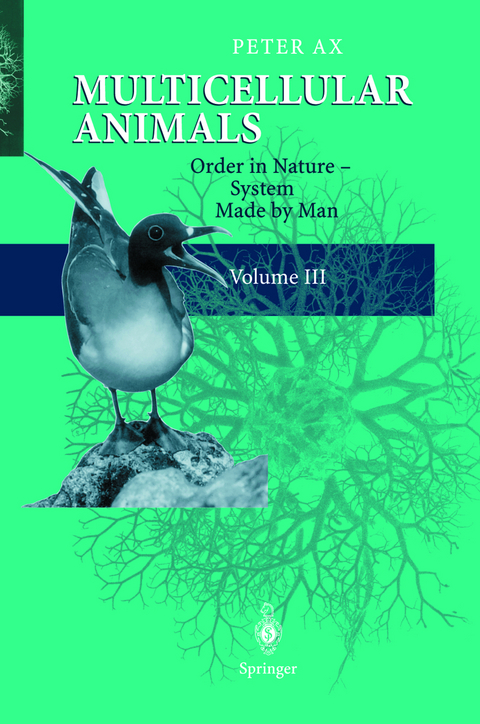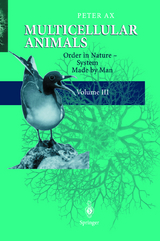Multicellular Animals
Springer Berlin (Verlag)
978-3-540-00146-1 (ISBN)
The turtle, toothless, soft bodied, enclosed in boney, shell, is primordial and invincible, slow and changeless. Locked into turtles of time and tradition, inertia and ignorance, darkness and fear, we cajole and pull, struggle and push until we learn that ideas set us free. Fairbanks, Alaska University Campus Sculpture LIz BIESOT 1985 The evolutionary order of organisms as a product of Nature and its repre sentation in a phylogenetic system as a construct of Man are two different things. The order in Nature consists of relationships between organisms. It is the result of an historic process that we call phylogenesis. When working with this order we must clearly differentiate between its identification and the subsequent description of what has been identified. When identifying the order we are placing ourselves in the framework of "hypothetical realism" (Vol. 1, p. 11); it is principally impossible to de termine how well or how poorly the real world and our cognitive appara tus match. For phylogenetics as an historicaUy directed discipline, how ever, the following limitation is more relevant. We cannot demonstrate ex perimentally wh ether or not that which we have interpreted from the prod ucts of phylogenesis corresponds to facts of (hypothetical) reality.
Prof. Dr. Peter Ax ist Professor für Zoologie an der Universität Göttingen. Schwerpunkte in Forschung und Lehre: Morphologie, Systematik und Stammesgeschichte der Tiere; Mitglied der Akademie der Wissenschaften und der Literatur in Mainz, der Akademie der Wissenschaften in Göttingen und der Joachim-Jungius-Gesellschaft der Wissenschaften in Hamburg.
Nemathelminthes.- Gastrotricha - Cycloneuralia.- Nematoida - Scalidophora.- Nematoda - Nematomorpha.- Vinctiplicata - Kinorhyncha.- Priapulida - Loricifera.- Rotifera - N. N. (Seison + Acanthocephala).- Monogononta - Bdelloida.- N. N.: Seison + Acanthocephala.- Seison - Acanthocephala.- Echinodermata - Stomochordata.- Crinoida - Eleutherozoa.- Asteroida - Cryptosyringida.- Ophiuroida - Echinozoa.- Echinoida - Holothuroida.- Rhabdopleura - Pharyngotremata.- Cephalodiscida - Cyrtotreta.- Enteropneusta - Chordata.- Tunicata - Vertebrata.- Acrania - Craniota.- Cyclostomata - Gnathostomata.- Petromyzonta - Myxinoida.- Chondrichthyes - Osteognathostomata.- Elasmobranchii - Holocephali.- Actinopterygii - Sarcopterygii.- Cladistia - Actinopteri.- Chondrostei - Neopterygii.- Ginglymodi - Halecostomi.- Halecomorphi - Teleostei.- Actinistia - Choanata.- Dipnoi - Tetrapoda.- Amphibia - Amniota.- Batrachia - Gymnophiona.- Urodela - Anura.- Sauropsida - Mammalia.- Chelonia - Diapsida.- Lepidosauria - Archosauria.- Rhynchocephalia - Squamata.- Crocodylia - Aves.- Paleognathae - Neognathae.- Monotremata - Theria.- Marsupialia - Placentalia.- References.
| Erscheint lt. Verlag | 8.4.2003 |
|---|---|
| Übersetzer | Richard Dunmur |
| Zusatzinfo | XIII, 317 p. |
| Verlagsort | Berlin |
| Sprache | englisch |
| Maße | 155 x 235 mm |
| Gewicht | 738 g |
| Themenwelt | Naturwissenschaften ► Biologie ► Evolution |
| Naturwissenschaften ► Biologie ► Zoologie | |
| Schlagworte | Acanthocephala • Acrania • Amniota • Chondrichthyes • Cladistia • classification • Hardcover, Softcover / Biologie/Zoologie • HC/Biologie/Zoologie • Metazoa • Phylogeny • Rotifera • Sauropsida • Stammesgeschichte • Systematics • Taxonomy • Tetrapoda • Tunicata • Vielzeller • Vielzeller / Metazoa • Zoology |
| ISBN-10 | 3-540-00146-8 / 3540001468 |
| ISBN-13 | 978-3-540-00146-1 / 9783540001461 |
| Zustand | Neuware |
| Haben Sie eine Frage zum Produkt? |
aus dem Bereich




